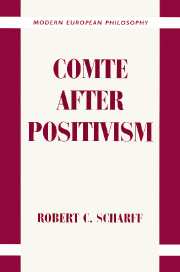Book contents
- Frontmatter
- Contents
- Preface
- Acknowledgments
- Note on Citations
- COMTE AFTER POSITIVISM
- Introduction: Comte for a Post-Positivist World
- Part I Comte Then
- Part II Comte Now
- 4 Comte's Ambiguous Legacy: Science Defended or Already Justified?
- 5 Cartesian Ahistoricism and Later Epistemic Analysis
- 6 Comte and the Very Idea of Post-Positivist Philosophy
- 7 Comte for Tomorrow?
- Bibliography
- Index
5 - Cartesian Ahistoricism and Later Epistemic Analysis
Published online by Cambridge University Press: 06 July 2010
- Frontmatter
- Contents
- Preface
- Acknowledgments
- Note on Citations
- COMTE AFTER POSITIVISM
- Introduction: Comte for a Post-Positivist World
- Part I Comte Then
- Part II Comte Now
- 4 Comte's Ambiguous Legacy: Science Defended or Already Justified?
- 5 Cartesian Ahistoricism and Later Epistemic Analysis
- 6 Comte and the Very Idea of Post-Positivist Philosophy
- 7 Comte for Tomorrow?
- Bibliography
- Index
Summary
The following attenuated tale of Descartes' epistemological turn serves as place holder for what could be a much longer story. Yet for everyone from Comte and Mill to the Logical Empiricists and post-positivists, this is of course a familiar story; hence, anything more ambitious seems unnecessary here. At the same time, when a story has become very familiar, one tends to hear it all too easily and to focus all too selectively on its most obvious – though not necessarily its most telling – features. It is now widely held that this has become the case with Descartes' story; and I have fashioned my tale to show I agree.
To explain my purpose, however, I need to emphasize that the story of Descartes' epistemological turn is about activities whose consequences we still inherit. It is eventually, crucially, and now more than somewhat uncomfortably our story – which means that its overfamiliarity can pose for us the following problem. In the very act of distancing ourselves from some obvious features of Cartesian thinking and in trying to formulate our own thinking in post-Cartesian terms, we may simultaneously fail to recognize how, in other ways, our very opposition continues to involve us crucially and uncomfortably in something Cartesian. As a matter of fact, I think that not only Comte but even some of today's most outspoken post-positivists are in precisely this fix.
- Type
- Chapter
- Information
- Comte after Positivism , pp. 128 - 142Publisher: Cambridge University PressPrint publication year: 1995

